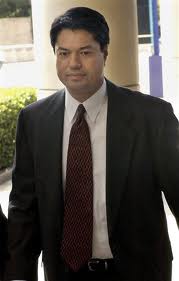 After a hearing in state court yesterday concluded, I was able to attend the conclusion of the resentencing hearing for Jamie Olis in U.S. District Judge Sim Lake’s court (Tom Fowler’s Chronicle article on the hearing is here). My sense is that the hearing went reasonably well for Olis.
After a hearing in state court yesterday concluded, I was able to attend the conclusion of the resentencing hearing for Jamie Olis in U.S. District Judge Sim Lake’s court (Tom Fowler’s Chronicle article on the hearing is here). My sense is that the hearing went reasonably well for Olis.
Judge Lake allowed Olis to make a personal statement to him during the hearing, and Olis’ statement was equally heartfelt and heart-wrenching.
Olis, who was not allowed even to look at his delightful and dedicated family in the courtroom during the two-day hearing, choked back tears as he told Judge Lake that he was sorry that he did not — as a young, mid-level executive at a big, publicly-owned company — question the judgment of proceeding with a transaction (Project Alpha) for which he was convicted, and that he was hugely frustrated that he could not do anything about it now. Although Judge Lake is notoriously hard to read, he was clearly moved by Olis’ statement.
In questioning the attorneys during final argument, Judge Lake was primarily interested in the general deterrent effect of the sentence.
Olis defense attorney David Gerger contended that the prison time that Olis has already served and the other ramifications from his conviction (fines, enjoined from serving as an officer of a public company, public humilation, etc) are more than a sufficient general deterrent for other mid-level executives at publicly-owned companies from engaging in wrongdoing, and that the lengthy sentence being proposed by the prosecution is really just a thinly-veiled deterrent for business executives from exercising their right to assert their innocence at trial.
Unfortunately, not mentioned during the hearing was the hugely detrimental effect that the Olis sentence could have on beneficial risk-taking that creates jobs for communities and wealth for shareholders.
Meanwhile, Judge Lake — who clearly has a sound understanding of the sentencing issues — zeroed in on the prosecution by asking why the government was asking for a sentence of a mid-level company executive who did not personally profit from the transaction for which he was convicted that is equal to or harsher than the recent sentences levied on several more senior executives who actually looted their companies while committing wrongdoing.
In what I thought was the defining moment of the portion of the hearing that I attended, the lead prosecutor could not answer Judge Lake’s pointed question and blathered on about how it was important to make Olis a poster boy for what can happen to a business executive who engages in corporate crime. There is no question that Judge Lake noticed the evasiveness of the prosecution on that key point.
So, what will Judge Lake do?
Given that he originally levied the 24+ year sentence on Olis and generally has a reputation of levying stiff sentences, a couple of fellow courtroom spectators predicted afterward that Judge Lake would come back with a 10-12 year sentence.
However, I know that Judge Lake is a man of compassion and grace, and the circumstances of Olis’ case simply do not call for a sentence of that length.
Thus, I’m betting that the sentence lands in the 4-7 year range, with the hope that it will fall into the lower part of that range and that Judge Lake will allow a portion of the sentence to be served in home detention or at least near Olis’ wife and young daughter. Judge Lake stated at the end of the hearing that he will likely issue his ruling late next week, so stay tuned.

Tom K. —
Thank you for your continuing attention to the tragic Jamie Olis case.
It always disturbs me when judges or attorneys apply the concept of deterrence to an individual. Deterrence should be a general effect that results from a fair and rational system of justice properly administered. The burden of deterrence should never be placed on the shoulders of an individual. In my opinion, a discussion of the systemic concept of deterrence has no place in a sentencing hearing.